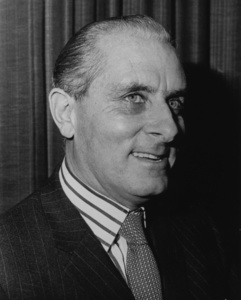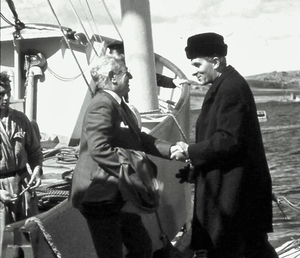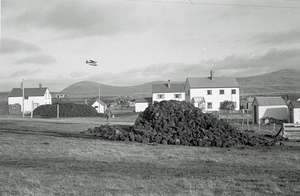FRENCH, NEVILLE ARTHUR IRWIN
1920 - 1995 from Kenya (also England)
governor, was born on 28 April 1920 in Kenya, son of Major Ernest French RE, and Alice French. He was educated in England at Selhurst School, Croydon. From school he joined the Royal Fleet Auxiliary, serving as a radio officer. He was amongst those rescued from an RFA vessel which was mined in the invasion of Sicily. Subsequently he served as an intelligence officer in the USA. He married Joyce Ethel Greene in 1945 and had one son and two daughters.
Following demobilisation in 1945 he took a degree in economics and comparative religion at the London School of Economics, joining the Colonial Service as an administrative officer in Tanganyika {Tanzania} in 1948. He worked there till 1962, becoming a district commissioner and leaving as principal assistant secretary for external affairs.
Towards the end of his time in Tanganyika French was a central figure in a notable confrontation between the forces of African nationalism and the colonial government in the run-up to Tanganyikan independence at the end of 1961. He was district commissioner of Geita in Sukumaland in 1957 and 1958 when the government's attempt to install a multiracial district council (as opposed to an all-African council) resulted in numerous illegal protest meetings and finally a mass march on Mwanza, the provincial capital, at the end of July 1958, which was dispersed by force with the use of tear gas. The policy was abandoned not long after following a change of governor. The interest of the incident lies in what it reveals about French's character in the light of his subsequent performance in the Falklands nearly twenty years later. Highly regarded as an administrator by his superiors, he found himself embattled and isolated in his single-mindedness and impatience in carrying out a policy which was not of his making against the increasing strength of African nationalist feeling.
Leaving Tanganyika after independence he joined the Commonwealth Relations Office (subsequently subsumed into the FCO). He was soon the subject of further controversy. Working in the British representative office in Salisbury {Harare} following Rhodesia's unilateral declaration of independence, he was accused by the illegal Smith regime of 'taking part in espionage directed at undermining Rhodesian economic and security matters' and required to leave the country at short notice. It appears that French was doing no more than perfectly properly researching and passing on information to the British government about Rhodesians travelling the world on sanctions breaking business. However, he had to return to London. He subsequently became head of chancery in Río de Janeiro (1972-75) and chargé d'affaires in Havana (1972-74) before being appointed to the governorship of the Falklands at the beginning of 1975. This was to prove an unhappy experience.
French came to the Falklands at a time of difficulty and tension in the relationship with Argentina which would have tested the mettle of any governor. In April the new British ambassador in Buenos Aires was obliged to warn the Argentines that an attack on the Islands would be met with a military response. The announcement in October 1975 of the terms of reference for Lord SHACKLETON's 1976 Report provoked an immediate hostile Argentine reaction. The Shackleton team which arrived on 3 January 1976 had not been permitted to travel via Argentina. On 4 February 1976 the RRS Shackleton 78 miles from the Falklands was fired upon by an Argentine destroyer which attempted to arrest her. Captain Philip WARNE contacted French who responded robustly and decisively, telling him to ignore the destroyer and proceed to Stanley.
On 11 February Mr Ted ROWLANDS, minister of state in the FCO met the new Argentine foreign minister in New York, obtaining assurances that the Shackleton could proceed with her research unhindered and agreeing in principle that the dialogue on the Falklands should in due course be resumed, (Franks Report p 12). In March 1976 the Cabinet approved Prime Minister CALLAGHAN's proposals for 'a fresh dialogue on all aspects of the dispute, both the possibility of Anglo-Argentine economic co-operation in the South-West Atlantic' and 'the notion of a hypothetical constitutional relationship.' (Franks p 13). In general HMG's tone appears to have been conciliatory, certainly too conciliatory for Islanders, although it was accompanied by warnings about the use of force and secret discussions in Whitehall about how the Islands might be recovered if captured. Britain had already agreed to an Argentine request for the withdrawal of the British ambassador on 20 February to de-escalate the situation and the various arrangements for collaboration with Argentina - the air service, the provision of fuel supplies and gas for cooking - continued while Shackleton's team did their work.
All these comings and goings seem to have aroused the deepest suspicions in the Islands. French found himself loyally defending the British position which was essentially one of cooperation with Argentina whilst parrying, though not rejecting out of hand, Argentine attempts to couple this with consideration of the sovereignty issue. In his first address to the LegCo in June 1975 he had felt able to say no more than that 'we live in an era of rapid change' and to commend 'imaginative and statesmanlike acceptance of the need for change,'(LegCo Minutes 17 June 1975). By the time he addressed LeCo a year later on 16 June 1976 he was regretting the 'stress and anxieties' caused by Argentine actions but making a point of 'recalling some of the more encouraging features of our relations with the Argentine people' and the need to achieve 'an evolving, harmonious and profitable relationship with our great neighbour' on the basis of 'the efficient and imaginative conduct of British diplomacy' and trust in 'the integrity of the British Government' in producing policies in the 'interests' both of Islanders and of its wider concerns in Latin America.
Whilst French's formal statements were carefully coded and were in accordance with British Government policy, it appears that his general behaviour made Islanders more and more uneasy and distrustful in an already tense atmosphere. He was, it was said, obsessed by security, and a Times article (26 August 1976) recorded that Government House was 'bolted and barred to an unusual degree'. He admitted that at one stage he was requiring the local news bulletin to be submitted to him before it was broadcast on the grounds that ' you could have all sorts of ... fabrications and extreme points of view being pushed out with apparent government blessing'. Yet the same Times correspondent expressed the view that he was 'undoubtedly sincere and has the interests of the Islanders at heart but does not seem able to convince them of this'.
He appears to have brought to his governorship of the Falklands many of the characteristics which had served him so ill in Tanganyika in 1958, nearly twenty years before: a single mindedness in carrying out what he correctly conceived to be his duty to his masters coupled with a strong authoritarian streak and lack of judgment. His obsessions about security and secrecy set up a barrier between him and the Islanders. He was openly criticised by the Falkland Islands Committee in London. His previous experience in Latin America (which the FCO doubtless thought appropriate and relevant) probably added to local suspicions. Delays in the FCO in implementing the recommendations by a local Select Committee to amend the Constitution to make it more democratic did not help.
On 14 October a very popular local pilot, Ian CAMPBELL, died in the crash of a FIGAS Beaver aircraft. There followed a strong disagreement between Governor French and Executive Councillors over the circumstances of the crash and the setting up of an enquiry into it and a subsequent angry public meeting of some 200 people on 20 October.
On 16 November Governor French announced that he was leaving the Islands on 2 December for consultations in the FCO about the Shackleton Report and would not be returning. Governor PARKER almost immediately replaced him. French had not been responsible for any single catastrophic decision and there is no evidence that he had any agenda apart from the implementation of British policy. His style, however, had increased Islanders' suspicions and apprehensions about that policy when what they needed was reassurance. French was governor of the Falkland Islands from 27 January 1975 until 2 December, 1976, the shortest tenure of any governor of recent times.
He subsequently served as deputy high commissioner in Madras until his retirement in 1980. He was awarded the LVO in 1968 and the CMG in 1976. He died on 21 April 1995 just short of his seventy-fifth birthday.
Comments
Revisions
July 2019 Two additional photographs added


